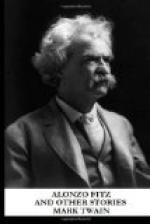“Sweetheart?”
“Yes, Alonzo?”
“Please don’t sing that any more this week—try something modern.”
The agile step that goes with a happy heart was heard on the stairs, and the Reverend, smiling diabolically, sought sudden refuge behind the heavy folds of the velvet window-curtains. Alonzo entered and flew to the telephone. Said he:
“Rosannah, dear, shall we sing something together?”
“Something modern?” asked she, with sarcastic bitterness.
“Yes, if you prefer.”
“Sing it yourself, if you like!”
This snappishness amazed and wounded the young man. He said:
“Rosannah, that was not like you.”
“I suppose it becomes me as much as your very polite speech became you, Mr. Fitz Clarence.”
“Mister Fitz Clarence! Rosannah, there was nothing impolite about my speech.”
“Oh, indeed! Of course, then, I misunderstood you, and I most humbly beg your pardon, ha-ha-ha! No doubt you said, ’Don’t sing it any more to-day.’”
“Sing what any more to-day?”
“The song you mentioned, of course, How very obtuse we are, all of a sudden!”
“I never mentioned any song.”
“Oh, you didn’t?”
“No, I didn’t!”
“I am compelled to remark that you did.”
“And I am obliged to reiterate that I didn’t.”
“A second rudeness! That is sufficient, sir. I will never forgive you. All is over between us.”
Then came a muffled sound of crying. Alonzo hastened to say:
“Oh, Rosannah, unsay those words! There is some dreadful mystery here, some hideous mistake. I am utterly earnest and sincere when I say I never said anything about any song. I would not hurt you for the whole world . . . . Rosannah, dear speak to me, won’t you?”
There was a pause; then Alonzo heard the girl’s sobbings retreating, and knew she had gone from the telephone. He rose with a heavy sigh, and hastened from the room, saying to himself, “I will ransack the charity missions and the haunts of the poor for my mother. She will persuade her that I never meant to wound her.”
A minute later the Reverend was crouching over the telephone like a cat that knoweth the ways of the prey. He had not very many minutes to wait. A soft, repentant voice, tremulous with tears, said:
“Alonzo, dear, I have been wrong. You could not have said so cruel a thing. It must have been some one who imitated your voice in malice or in jest.”
The Reverend coldly answered, in Alonzo’s tones:
“You have said all was over between us. So let it be. I spurn your proffered repentance, and despise it!”
Then he departed, radiant with fiendish triumph, to return no more with his imaginary telephonic invention forever.
Four hours afterward Alonzo arrived with his mother from her favorite haunts of poverty and vice. They summoned the San Francisco household; but there was no reply. They waited, and continued to wait, upon the voiceless telephone.




